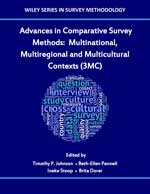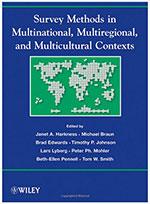Chapter 2 Review Questions Cultural Studies Intro to Global Awareness Answer Key
Welcome to the Cross-Cultural Survey Guidelines!
These Guidelines were developed as function of the Comparative Survey Pattern and Implementation (CSDI) Guidelines Initiative. The aim of the Initiative was to promote internationally recognized guidelines that highlight best practice for the deport of multinational, multicultural, or multiregional surveys, which we refer to equally '3MC' surveys. The intended audience is researchers and survey practitioners planning or engaged in comparative survey research beyond cultures or countries.
SeeChapters to access the guidelines, which cover all aspects of the survey lifecycle.
The CCSG Guidelines depict upon and are based on: (ane) general good exercise survey methodology, every bit well as cross-cultural and comparative literature on survey methodology; (2) available study-specific manuals and documentation; and (3) the experiences and lessons learned that authors, reviewers, and editors have added through their work on and with numerous comparative surveys.
Best practices are dynamic and can be expected to evolve over fourth dimension. At the present fourth dimension, the Guidelines chronicle to not just cantankerous-sectional surveys of households and individuals but likewise computer-assisted personal interviewing modes and the usage of paradata and statistical analyses. At a after point in time, they may be expanded to include establishment and longitudinal surveys.
The CCSG Advisory Committee advises the CSDI Executive Commission periodically on additional content to add together to the guidelines as well as to online short courses. The Advisory Committee as well advises on promotional activities and reviews new content. A list of current members of the CCSG Advisory Committee can be accessed here.
Equally more documentation and information about comparative surveys become available, we hope to incorporate the lessons learned from these studies into the CCSG Guidelines. New methodological research will besides inform new versions of the CCSG Guidelines. You can profoundly help u.s. in these objectives past providing suggestions, or merely alerting us most a topic we demand to address; delight feel gratis to contact the states if you have whatever questions or comments.
Janet A. Harkness Student Newspaper Laurels

Nosotros dedicate these guidelines to Dr. Janet A. Harkness. Dr. Harkness passed away in 2012. She initiated the International Workshop on Comparative Survey Design and Implementation where the evolution of these Guidelines was launched. Dr. Harkness not merely contributed to the overall framework and content of the guidelines but she also authored iii of the original key chapters: Questionnaire Design, Accommodation and Translation. She inspired this piece of work through her steadfast confidence that resources must be fabricated available to researchers and survey practitioners if nosotros are to improve comparative survey research methods, dissemination and analysis.
The World Association for Public Stance Enquiry (WAPOR) and the American Clan for Public Stance Research (AAPOR) jointly support Dr. Harkness's piece of work by sponsoring the Janet A. Harkness Student Paper Award each year. This award recognizes "emerging young scholars in the report of multi-national/multi-cultural/multi-lingual survey research (aka 3MC survey research) through support of the winner'southward participation in the WAPOR Conference and a greenbacks prize." Please consider donating to this effort in gratitude for Dr. Harkness's legacy in the field of cross-cultural, comparative survey inquiry.
Origins of CCSG
The CCSG initiative was spearheaded by Beth-Ellen Pennell, the manager (retired) of international survey operations at the Survey Research Heart, Institute for Social Research at the University of Michigan. As well instrumental in the development and operationalization of the guidelines were Kirsten Alcser and Sue Ellen Hansen (retired) of Survey Research Operations, Survey Research Center, Institute for Social Enquiry, and the late Janet Harkness of the Survey Enquiry and Methodology Program, University of Nebraska-Lincoln. The guidelines were initiated at the 2005 meeting of CSDI and have involved more than 70 individuals from more than 35 organizations worldwide.
Advances in Comparative Survey Methods: Multinational, Multiregional and Multicultural Contexts (3MC)
 Since the publication of the last 3MC monograph (2010), there take been substantial methodological, operational and technical advances in comparative survey research. At that place are besides whole new areas of methodological evolution including collecting biomarkers, the human subject field regulatory surroundings, innovations in information collection methodology and sampling techniques, use of paradata across the survey lifecycle, metadata standards for broadcasting, every bit well as new analytical techniques. This new monograph follows the survey lifecycle and include chapters on study design and considerations, sampling, questionnaire design (assuming multi-linguistic communication surveys), translation, mixed mode, the regulatory surroundings, data drove, quality balls and control, analysis techniques and data documentation and broadcasting. The tabular array of contents can be accessed here.
Since the publication of the last 3MC monograph (2010), there take been substantial methodological, operational and technical advances in comparative survey research. At that place are besides whole new areas of methodological evolution including collecting biomarkers, the human subject field regulatory surroundings, innovations in information collection methodology and sampling techniques, use of paradata across the survey lifecycle, metadata standards for broadcasting, every bit well as new analytical techniques. This new monograph follows the survey lifecycle and include chapters on study design and considerations, sampling, questionnaire design (assuming multi-linguistic communication surveys), translation, mixed mode, the regulatory surroundings, data drove, quality balls and control, analysis techniques and data documentation and broadcasting. The tabular array of contents can be accessed here.
Survey Methods in Multicultural, Multinational, and Multiregional Contexts
 Written and edited by experts in the fields, Survey Methods in Multicultural, Multinational, and Multiregional Contexts provides an overview of comparative multinational, multiregional, and multicultural problems in survey methodology. Part of the Wiley Series in Survey Methodology, this volume explores the issue of quality in multipopulation surveys and the level of methodological expertise in comparative survey enquiry. The text, including models of design, multilingual issues, and more on developing countries, is fundamental for statisticians, researchers, and students interested in design and implementation of international, national, and cultural comparative surveys. The text received the 2013 AAPOR Book Accolade, "recognizing influential books that take stimulated theoretical and scientific enquiry in public opinion; and/or influenced our understanding or application of survey inquiry methodology." To purchase a re-create, please follow this link.
Written and edited by experts in the fields, Survey Methods in Multicultural, Multinational, and Multiregional Contexts provides an overview of comparative multinational, multiregional, and multicultural problems in survey methodology. Part of the Wiley Series in Survey Methodology, this volume explores the issue of quality in multipopulation surveys and the level of methodological expertise in comparative survey enquiry. The text, including models of design, multilingual issues, and more on developing countries, is fundamental for statisticians, researchers, and students interested in design and implementation of international, national, and cultural comparative surveys. The text received the 2013 AAPOR Book Accolade, "recognizing influential books that take stimulated theoretical and scientific enquiry in public opinion; and/or influenced our understanding or application of survey inquiry methodology." To purchase a re-create, please follow this link.
Source: http://www.ccsg.isr.umich.edu/index.php/chapters/questionnaire-design-chapter